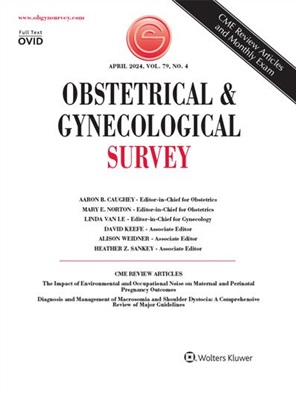Uterine Prolapse in Pregnancy: A Review
IF 4.3
4区 医学
Q1 OBSTETRICS & GYNECOLOGY
引用次数: 0
Abstract
Importance Although not a common occurrence, uterine prolapse during pregnancy can have significant effects for pregnancy outcomes and quality of life of maternal patients. Most data about management exist as case reports; a review of these cases provides some guidance about treatment options. Objectives This review examines current literature about uterine prolapse during pregnancy to assess current information about this condition, prevalence, diagnosis, management, and outcomes. Evidence Acquisition Electronic databases (PubMed and Embase) were searched using terms “uterine prolapse” AND “pregnancy” AND “etiology” OR “risk factors” OR “diagnosis” OR “therapy” OR “management” limited to the English language and between the years 1980 and October 31, 2022. Results Upon review of 475 articles, 48 relevant articles were included as well as 6 relevant articles found on additional literature review for a total of 54 articles. Of those articles, 62 individual cases of uterine prolapse in pregnancy were reviewed including pregnancy complications, mode of delivery, and outcomes. Prevalence was noted to be rare, but much more common in second and subsequent pregnancies. Most diagnoses were made based on symptomatic prolapse on examination. Management strategies included bed rest, pessary use, and surgery (typically during the early second trimester). Complications included preterm delivery, patient discomfort, urinary retention, and urinary tract infection. Delivery methods included both cesarean and vaginal deliveries. Conclusions Although a rare condition, uterine prolapse in pregnancy is readily diagnosed on examination. Reasonable conservative management strategies include observation, attempted reduction of prolapse, and pessary use; if these measures fail, surgical treatment is an option. Relevance Our review compiles literature and known cases of uterine prolapse during pregnancy and current evidence about prevalence, diagnosis, management, outcomes, and complications of uterine prolapse during pregnancy in order to inform our target audience in their clinical practice. Target Audience Obstetricians and gynecologist, family physicians. Learning Objectives After completing this learning activity, the participant should be able to describe the prevalence of uterine prolapse during pregnancy, potential at-risk populations, and presenting symptoms; identify management strategies for uterine prolapse during pregnancy including both surgical and conservative approaches; and assess possible complications of uterine prolapse during pregnancy.妊娠期子宫脱垂:综述
重要性虽然妊娠期子宫脱垂并不常见,但对妊娠结局和产妇生活质量有显著影响。大多数关于管理的数据以病例报告的形式存在;对这些病例的回顾提供了一些治疗选择的指导。目的:本综述回顾了目前关于妊娠期子宫脱垂的文献,以评估目前关于这种情况、患病率、诊断、管理和结局的信息。检索电子数据库(PubMed和Embase),使用术语“子宫脱垂”和“妊娠”以及“病因学”或“危险因素”或“诊断”或“治疗”或“管理”,仅限于英语,时间范围为1980年至2022年10月31日。结果共检索475篇文献,纳入相关文献48篇,附加文献检索发现相关文献6篇,共54篇。本文回顾了62例妊娠期子宫脱垂的病例,包括妊娠并发症、分娩方式和结局。患病率被认为是罕见的,但在第二次和随后的怀孕中更为常见。大多数诊断是基于检查时的症状性脱垂。治疗策略包括卧床休息、必要的使用和手术(通常在妊娠中期早期)。并发症包括早产、患者不适、尿潴留和尿路感染。分娩方式包括剖宫产和阴道分娩。结论妊娠期子宫脱垂是一种罕见的疾病,但可通过检查诊断。合理的保守治疗策略包括观察、尝试复位脱垂和必要的使用;如果这些措施失败,手术治疗是一种选择。我们的综述收集了有关妊娠期子宫脱垂的文献和已知病例,以及妊娠期子宫脱垂的患病率、诊断、治疗、结局和并发症的最新证据,以便在临床实践中为我们的目标受众提供信息。目标受众:妇产科医生、家庭医生。学习目标完成本学习活动后,参与者应能够描述妊娠期间子宫脱垂的患病率、潜在危险人群和出现的症状;确定妊娠期子宫脱垂的治疗策略,包括手术治疗和保守治疗;并评估妊娠期间子宫脱垂的可能并发症。
本文章由计算机程序翻译,如有差异,请以英文原文为准。
求助全文
约1分钟内获得全文
求助全文
来源期刊
CiteScore
2.70
自引率
3.20%
发文量
245
审稿时长
>12 weeks
期刊介绍:
Each monthly issue of Obstetrical & Gynecological Survey presents summaries of the most timely and clinically relevant research being published worldwide. These concise, easy-to-read summaries provide expert insight into how to apply the latest research to patient care. The accompanying editorial commentary puts the studies into perspective and supplies authoritative guidance. The result is a valuable, time-saving resource for busy clinicians.

 求助内容:
求助内容: 应助结果提醒方式:
应助结果提醒方式:


